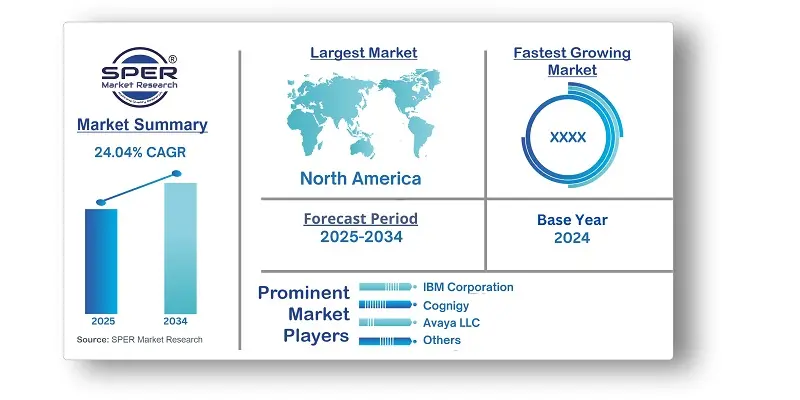
Call Center AI Market Growth, Trends, Size, Revenue, Analysis, Demand, Future Outlook
Call Center AI Market Growth, Size, Trends Analysis - By Component, By Application, By End Use - Regional Outlook, Competitive Strategies and Segment Forecast to 2034
| Published: Jan-2025 | Report ID: IACT2503 | Pages: 1 - 245 | Formats*: |
| Category : Information & Communications Technology | |||


- In March 2022, Avaya established a strategic partnership with Alcatel-Lucent to extend the availability of Avaya’s OneCloud CCaaS composable solutions to Alcatel-Lucent’s global customer base, and to provide Alcatel-Lucent’s digital networking solutions worldwide to Avaya customers.
- In January 2022, Sprinklr and Google Cloud teamed up to assist enterprises in rethinking their strategies for managing customer experience. Sprinklr teamed up with Google Cloud to fast-track its market-entry strategy and enhance awareness among shared customers. Sprinklr will collaborate closely with the global salesforce, leveraging deep relationships with enterprises that have opted to build on Google Cloud.
- In September 2021, NICE partnered with Google Cloud to meet the increasing need for customer self-service systems that are more effective and automated, while also integrating with traditional contact centers. NICE is incorporating its AI-driven, cloud-based CXone customer experience platform.
| Report Metric | Details |
| Market size available for years | 2021-2034 |
| Base year considered | 2024 |
| Forecast period | 2025-2034 |
| Segments covered | By Component, By Application, By End Use. |
| Regions covered | North America, Latin America, Asia-Pacific, Europe, and Middle East & Africa. |
| Companies Covered | 8x8 Inc., Amazon Web Services Inc. (AWS), Artificial Solutions, Avaya LLC, Cognigy, Dialpad, Google LLC, IBM Corporation, Microsoft Corporation, and NICE Systems Ltd. |
- Global Call Center AI Market Size (FY’2021-FY’2034)
- Overview of Global Call Center AI Market
- Segmentation of Global Call Center AI Market By Component (Solution, Services)
- Segmentation of Global Call Center AI Market By Application (Predictive Call, Routing, Journey Orchestration, Quality Management, Sentiment Analysis, Workforce Management & Advanced Scheduling and Others)
- Segmentation of Global Call Center AI Market By End Use (BFSI, IT & Telecommunication, Healthcare, Retail & E-commerce, Energy & Utilities, Travels & Hospitality, Others)
- Statistical Snap of Global Call Center AI Market
- Expansion Analysis of Global Call Center AI Market
- Problems and Obstacles in Global Call Center AI Market
- Competitive Landscape in the Global Call Center AI Market
- Details on Current Investment in Global Call Center AI Market
- Competitive Analysis of Global Call Center AI Market
- Prominent Players in the Global Call Center AI Market
- SWOT Analysis of Global Call Center AI Market
- Global Call Center AI Market Future Outlook and Projections (FY’2025-FY’2034)
- Recommendations from Analyst
1.1. Scope of the report1.2. Market segment analysis
2.1. Research data source
2.1.1. Secondary Data2.1.2. Primary Data2.1.3. SPERs internal database
2.1.4. Premium insight from KOLs
2.2. Market size estimation
2.2.1. Top-down and Bottom-up approach
2.3. Data triangulation
4.1. Driver, Restraint, Opportunity and Challenges analysis
4.1.1. Drivers4.1.2. Restraints4.1.3. Opportunities4.1.4. Challenges
5.1. SWOT Analysis
5.1.1. Strengths5.1.2. Weaknesses5.1.3. Opportunities5.1.4. Threats
5.2. PESTEL Analysis
5.2.1. Political Landscape5.2.2. Economic Landscape5.2.3. Social Landscape5.2.4. Technological Landscape5.2.5. Environmental Landscape5.2.6. Legal Landscape
5.3. PORTERs Five Forces
5.3.1. Bargaining power of suppliers5.3.2. Bargaining power of buyers5.3.3. Threat of Substitute5.3.4. Threat of new entrant5.3.5. Competitive rivalry
5.4. Heat Map Analysis
6.1. Global Call Center AI Market Manufacturing Base Distribution, Sales Area, Product Type6.2. Mergers & Acquisitions, Partnerships, Product Launch, and Collaboration in Global Call Center AI Market
7.1. Solution
7.2. Services
7.2.1. Professional Services7.2.2. Training and Consulting7.2.3. System Integration & Implementations7.2.4. Support & Maintenance7.2.5. Managed Services
8.1. Predictive Call Routing
8.2. Journey Orchestration8.3. Quality Management8.4. Sentiment Analysis8.5. Workforce Management & Advanced Scheduling8.6. Others
9.1. BFSI9.2. IT & Telecommunication9.3. Healthcare9.4. Retail & E-commerce9.5. Energy & Utilities9.6. Travels & Hospitality9.7. Others
10.1. Global Call Center AI Market Size and Market Share
11.1. Asia-Pacific
11.1.1. Australia11.1.2. China11.1.3. India11.1.4. Japan11.1.5. South Korea11.1.6. Rest of Asia-Pacific
11.2. Europe
11.2.1. France11.2.2. Germany11.2.3. Italy11.2.4. Spain11.2.5. United Kingdom11.2.6. Rest of Europe
11.3. Middle East and Africa
11.3.1. Kingdom of Saudi Arabia11.3.2. United Arab Emirates11.3.3. Qatar11.3.4. South Africa11.3.5. Egypt11.3.6. Morocco11.3.7. Nigeria11.3.8. Rest of Middle-East and Africa
11.4. North America
11.4.1. Canada11.4.2. Mexico11.4.3. United States
11.5. Latin America
11.5.1. Argentina11.5.2. Brazil11.5.3. Rest of Latin America
12.1. 8x8 Inc.
12.1.1. Company details12.1.2. Financial outlook12.1.3. Product summary12.1.4. Recent developments
12.2. Amazon Web Services Inc.
12.2.1. Company details12.2.2. Financial outlook12.2.3. Product summary12.2.4. Recent developments
12.3. Artificial Solutions
12.3.1. Company details12.3.2. Financial outlook12.3.3. Product summary12.3.4. Recent developments
12.4. Avaya LLC
12.4.1. Company details12.4.2. Financial outlook12.4.3. Product summary12.4.4. Recent developments
12.5. Cognigy
12.5.1. Company details12.5.2. Financial outlook12.5.3. Product summary12.5.4. Recent developments
12.6. Dialpad
12.6.1. Company details12.6.2. Financial outlook12.6.3. Product summary12.6.4. Recent developments
12.7. Google LLC
12.7.1. Company details12.7.2. Financial outlook12.7.3. Product summary12.7.4. Recent developments
12.8. IBM Corporation
12.8.1. Company details12.8.2. Financial outlook12.8.3. Product summary12.8.4. Recent developments
12.9. Microsoft Corporation
12.9.1. Company details12.9.2. Financial outlook12.9.3. Product summary12.9.4. Recent developments
12.10. Others
SPER Market Research’s methodology uses great emphasis on primary research to ensure that the market intelligence insights are up to date, reliable and accurate. Primary interviews are done with players involved in each phase of a supply chain to analyze the market forecasting. The secondary research method is used to help you fully understand how the future markets and the spending patterns look likes.
The report is based on in-depth qualitative and quantitative analysis of the Product Market. The quantitative analysis involves the application of various projection and sampling techniques. The qualitative analysis involves primary interviews, surveys, and vendor briefings. The data gathered as a result of these processes are validated through experts opinion. Our research methodology entails an ideal mixture of primary and secondary initiatives.



Frequently Asked Questions About This Report
PLACE AN ORDER
Year End Discount
Sample Report
Pre-Purchase Inquiry
NEED CUSTOMIZATION?
Request CustomizationCALL OR EMAIL US
100% Secure Payment






Related Reports
Our Global Clients
Our data-driven insights have influenced the strategy of 200+ reputed companies across the globe.




















